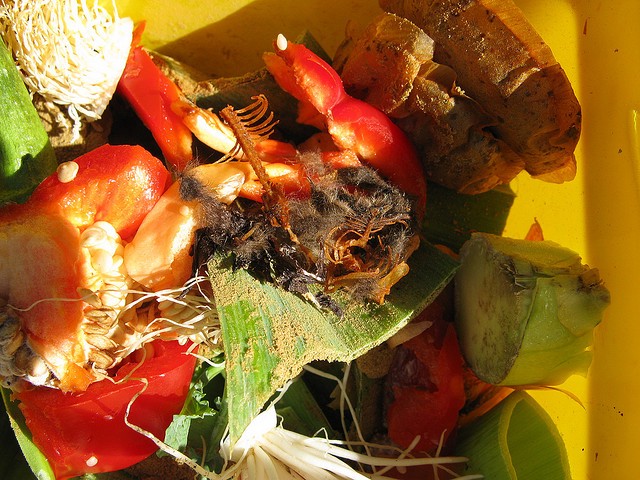Did You Remember To Compost Your Thanksgiving Garbage?
Did You Remember To Compost Your Thanksgiving Garbage?

The most environmentally ethical way to deal with the waste of Thanksgiving feasts is to go to somebody else’s house or a restaurant, so you can “let others worry about it.” But millions of us who hosted the holiday dinner are now left with the additional work/guilt of doing something with all the rotting containers of increasingly gross five-day-old leftovers in the fridge.
The EPA says that “food waste” is now the “largest component of municipal solid waste being sent to landfills,” at more than 33 million tons per year. That’s good, because it means that recyclables like cardboard and aluminum and plastic are no longer the bulk of stuff going to garbage dumps. But it’s also bad, because most of that food waste can be composted for use on gardens and farmland. And yet it’s also impossible, because unless you live in a magical liberal city like San Francisco, which provides compost bins and weekly pickup for all residents, you’re supposed to figure this out for yourself, and also work for a living, etc.
We will not report you to Michelle Obama (this time) if you just dump all this stinking filth into, say, your neighbor’s trash bin. But if you are driven by guilt, smugness or pure good intentions, we will help you clean your refrigerator, sustainably!
First, designate something as a “compost bin,” if you don’t have one already. You do not need to spend $200 on a fancy piece of plastic. A regular little garbage can works fine, as does any container from the dollar store or even a thick cardboard box. Make some holes in the side with an awl or a handgun or whatever’s around, and dump your gross scraps inside. Roll it around now and then (with the lid on, right?!), alternate the food goop with delivery menus and newspapers and maybe some dry leaves you sweep off the steps, and in the spring you’ll have free plant food for your little garden, or you can give it to your neighbor who actually knows how to grow things, and then maybe she’ll give you tomatoes all summer.
Is this the time to talk about “cold weather composting”? No, not today. Just know you can continue to keep your compost outside until the below-freezing weather really sets in. Then you either need to put it in the basement or under the kitchen sink or become one of those people who builds a Winter Composting System — and if you’re that kind of person, you certainly don’t need to be reading this particular page of the Internet.
For specific guidance on the Thanksgiving leftovers, we turn to the Environmental Industry Associations, which is what the trade group for the garbage industry now calls itself, to sound more “green” as they’re all forced to comply with strict new waste and recycling laws in America’s cities and counties. Here is what you can do:
- Soggy vegetables, cranberry sauce, all green-ish stuff: Compost it! Add some dry newspaper and leaves so the stuff doesn’t turn into a living mold monster before the magic organisms start to “cook” and actually get warm.
- Stale bread: Saw it up into croutons, so easy! Nothing makes a salad “taste like real food” more than a pile of toasted bread cubes covered in olive oil and salt and seasoning.
- Disgusting cardboard pie boxes: Compost. Get it out of the fridge; that one slice of congealed fructose and liquified crust is not something you want to find a few days from now, when you’re high.
- Corpses of animals: Did you fry a turkey or something? Well, congratulations on that toddler-sized carcass in your tiny fridge. If you’ve got composting pickup, hooray. If not, those bones are going to be in your little compost bucket for probably two years? Might as well throw the carcass in a pot of boiling water and “make stock,” and then toss the skeleton. Nobody even likes turkey, have you noticed that? Next year, skip the turkey.
- Do not put plastic wrap or aluminum foil or even those “compostable” plastic forks in your kitchen compost; those utensils do break down, eventually, but I have found them mostly intact at the bottom of a five-year-old compost pile, fossilized.
Photo by Robbie Sproule.
Ken Layne once wrote a novel that included composting as a major plot element.
